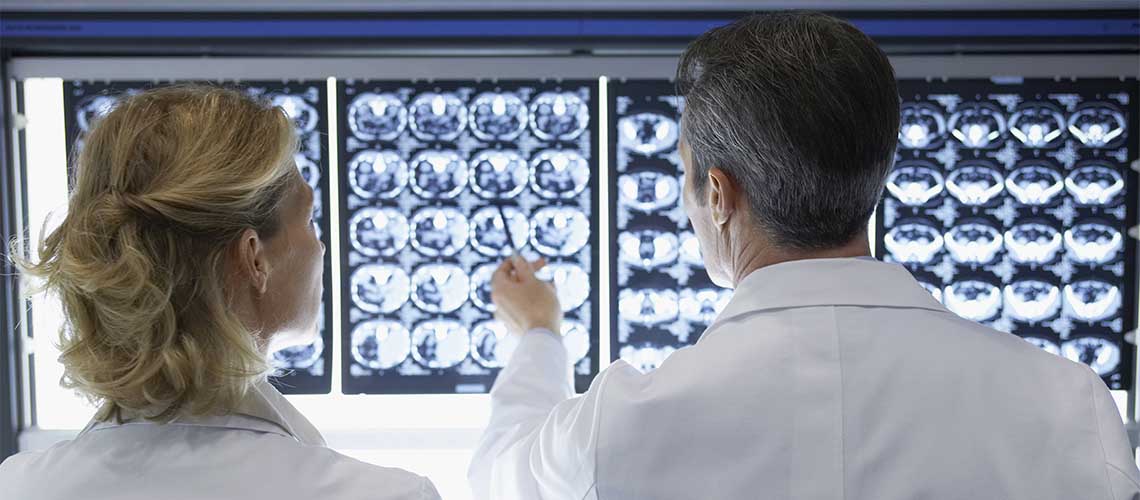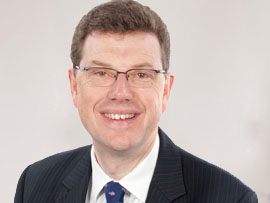Better together
Cancer Research at The University of Manchester takes place within the Division of Cancer Sciences where internationally renowned Clinical Oncologist, Professor Tim Illidge believes that it is the combination of clinical and scientific research teams, and their multidisciplinary working, which is driving innovations in personalised cancer medicine.

For me, the strengths of cancer research in Manchester are secondary to the strength of the unique partnership that we have within the Manchester Cancer Research Centre (MCRC).
At the centre of this are three very large and effective partners working together in a way that no other cancer centres do. With Europe’s largest cancer hospital (The Christie), the UK’s largest single-site university, and the largest cancer research charity (Cancer Research UK) working together, exciting possibilities come to fruition. This is what sets us apart, makes us world-leading and the envy of other cancer centres.
All the partners bring something different and unique to this partnership. For the University, it’s the incredible breath of our cancer research. All of the clinical academics and many of the discovery scientists within this research community are working within the Division of Cancer Sciences.
Our clinical academics include medical oncologists, radiation oncologists, surgeons, pathologists and radiologists. Other unique groups include the growing talent of academic physicists who are now working at the interface with the clinical team and include world-renowned experts in imaging, mathematical modelling experts and big data analysis within the radiotherapy-related research group.
“In the past, we’ve taken a pragmatic approach and treated all cancers in same way but now we’re in an era of personalised medicine.”
Access to expertise
Among our medical oncologists we have leaders in delivering experimental cancer medicine who are pioneers in early and later phase trial design and development. The radiotherapy-related research group has been transformed beyond recognition in the last few years from just a few individuals to a team of over 100 thanks to a recent and large-scale infrastructure investment.
This has led to us becoming the national centre for protons, receiving additional Department of Health funding.
Similarly huge investments in research have allowed us to recruit a number of world leading researchers, including Marcel van Herk, Karen Kirkby and Peter Hoskin, who work alongside a rich pool of Manchester-grown talent that these investments have helped us to retain.
We have clinical specialty in haematologists, pathologists and radiologists. We’re incredibly diverse and our uniqueness in cancer sciences is the breadth of the research that we undertake. This is based in discovery science that allows us to move into the clinic and perform clinical translational research, which in turn enables early phase and late phase clinical trial design.
The most important part is getting the discovery scientists integrated and working alongside the clinical teams.

Professor Tim Illidge
Professor Tim Illidge is a Professor of Targeted Therapy and Oncology at The University of Manchester and Honorary Consultant in Clinical Oncology at Christie Hospital NHS Foundation Trust.
Whole spectrum approach
We work collaboratively across the whole spectrum of research from discovery to clinical implementation but this won’t happen if we have siloed working and the research and clinical teams don’t communicate effectively. Modern cancer research is cyclical. If you are working in the clinic and see a clinical problem or need, you then try and address that with the scientists in a dialogue.
This could result in a different approach to treatment stemming from your idea, or the development of a new drug which you take back to the clinic and learn from; it’s a constantly evolving cycle. What’s important when it comes to making rapid progress is the dialogue. It’s no longer just bench to bedside but bedside to bench. The cycle never stops. The challenge for us in MCRC is how to make this dialogue and this team science approach happen as often as possible across Manchester.
As a Clinical Scientist I start with a clinical problem that I want to try and address within my laboratory research. For me, success is taking what I learn in my laboratory back to the clinic and being able to test novel drugs and approaches in a timely fashion that allows us to know if we’re making progress or not. This is currently one of the biggest challenges for the research community and something we’re able to progress our knowledge of, through multidisciplinary working.
Understanding personalisation
Today, we have so many targets, drugs and druggable targets that the combinations and opportunities are limitless. Knowing how to approach the problem can be the biggest challenge. In the past, we’ve taken a pragmatic approach and treated all cancers in same way but now we’re in an era of personalised medicine.
We know far more about the genetics and the tumour immunology of particular tumours and, through the development of biomarkers, we’re beginning to understand more about which patients are more likely to respond well to certain drugs or treatments. So the challenge now is to ensure that we offer the right treatment approach to the right patient, rather than the more generic approach that we’ve offered previously.
For a long time we’ve tried to modify treatment based on the patients age and comorbidities. While that is in itself is a personalised approach, we need to go beyond that and address a much wider range of the tumour biology and how it interacts with each host patient. This however is a challenge because the tumour is always evolving and so we need to revisit and re-biopsy the tumour and modify treatment according to what’s happening in real time. This is something we’re getting better at with imaging, pathology, genomics, proteomics and immunology; because of this multi-team approach our collective efficiency is increased.
In cancer drug therapy we’re also routinely questioning the appropriateness and relevance of the right drug, for the right patient, at the right time. In radiotherapy we’re asking which patients need fewer treatments and which require a boost of dose. Rather than asking do we need to treat the cancer and the regional node? Consider, can we give a smaller dose to some patients so that a personalised approach is developed? In surgery another example of this increasing personalisation of care is reviewing which patients actually require treatment for prostate, as many men develop the disease but many of these don’t actually require treatment. It’s about knowing who to treat and when.
Analysing and understanding the theranostics (the outcomes or big data analysis on the huge amounts of data on the patients we look after) will be crucial in informing how we can better treat future patients, identifying groups who will benefit from treatments and improving patient treatment strategies. Mining this patient outcome data will become crucially important to us moving forward and becoming world-leading.
My ambitions for our research community are simply to build on the unique partnership that we have and to encourage research teams to work together, continuing to perform team science. Teams that communicate, collaborate and integrate will enable us to tackle the big problems in cancer much quicker.
A more unified and multidisciplinary research approach will facilitate free communication, helping us to progress our research and knowledge though mutual understanding. The future is exciting.
Manchester’s approach to research spans the whole spectrum, from discovery to clinical implementation
